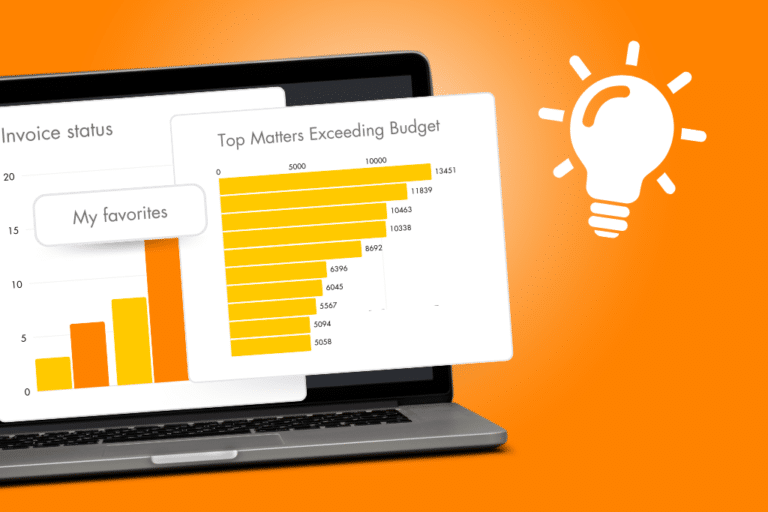Two-thirds of business leaders believe that their companies must become more digitized in order to stay competitive. Yet, according to Gartner, 81% of legal departments in 2018 ‘are unprepared for digitalization’, jeopardizing in the process their ability to manage risks and slowing internal processes. So, how can your legal department make the leap today? The answer? Business Intelligence.

What is Business Intelligence?
Gartner defines Business Intelligence or BI as an ‘umbrella term that includes the applications, infrastructure and tools, and best practices that enable access to and analysis of information to improve and optimize decisions and performance’. Essentially BI can lend companies, especially legal departments, a sophisticated analysis of key information relating to legal activities, employee performance and clear analytical data reporting.
BI is a dynamic and fast-evolving market as demand from organizations to better grapple with and leverage critical and everyday data becomes more imperative. The value of BI is in its agility and intuitive capabilities to break down data to generate and analyze it quicker than more traditional methods currently in legal departments.
A study by McKinsey & Company that looked at digital reinvention found that ‘the digital winners’ consistently and ‘closely tie their digital and corporate strategies’ together. While legal departments are more reticent in adopting technology, they must knuckle down and see technology as a key tool to increased growth in 2019. PWC’s Annual Law Firms’ Survey 2018 showed that 100% of the top ten legal firms surveyed responded that technology is a key challenge to growth in the next two years. For those who are slow on the uptake, figures point to a downward spiral. According to data from Forrester, 25% of companies in 2019 will decelerate their digital efforts completely and lose market shares.
How Can Business Intelligence Inform Data Driven Decisions?
Here are three key ways legal departments can get on board with BI:
1: Key Indicators
The DiliTrust Governance suite is a collaborative legal platform that has been designed to meet the requirements of corporate legal professionals, particularly in terms of operational efficiency, productivity, security, and functional business coverage.
The suite has inbuilt BI functionalities so that users can access monitoring indicators in real time. It also offers standard and customizable dashboards, adaptable to your specific needs and the features you and your team require.
Examples of indicators that can be monitored via the tool include:
- Number of contracts/disputes per status
- Average time for resolving a dispute
- Success rate of claimant disputes
The performance indicators (KPIs) monitored in the solution help you deliver simple, accurate messages, trigger actions to optimize your performance, and enable you to compare the efficiency of your activities over time.
2: Information Governance
Research indicates that ‘only 37% of legal and compliance leaders have a formal information governance structure’ in place.
In order to better secure their data, legal departments need to strategically organize and coherently manage it. But why? Legal firms are faced with sifting through masses of crucial data daily. For scale, the world produces 2.5 quintillion bytes of data a day, with 90% of data in the world today created in the last two years. According to the Harvard Business Review, ‘less than 1% of unstructured data is analyzed or used at all’.
Furthermore, 70% of employees have access to data they should not have. It is crucial for legal departments to use Business Intelligence to manage data but also to improve efficiency, manage risks and meet regulatory compliance requirements.
3: One Step Ahead: Horizon Expertise
According to the Harvard Business Review, digital reinvention only works if companies master the right digital technology architecture. In their 2018 law firms survey, PWC recommends that legal departments must remain aware of ‘all available emerging technologies’ and select ones that are the best fit for the organization in order to remain competitive and ahead of the curve. The report also stated that more than 50% of the Top 100 UK firms had started, or were in the planning stages, of ‘projects relating to Risk & Compliance or Data Analytics’.
Business Intelligence enables law firms to have complete confidence in analysis in areas of exposure and risk, among others. Access to the data afforded by Business Intelligence, such as the prediction of legal costs, assists departments in operational strategy and working more efficiently in terms of compliance needs. International law firm Seyfarth Shaw in conversation with McKinsey & Company about their legal digital transformation noted that clients are now seeking ‘horizon expertise’ from their legal team to anticipate ‘what is coming, instead of paying us to solve the current problem’. Business Intelligence allows law firms to identify client needs better and to make better-informed decisions on their behalf, so that legal professionals remain one step ahead in a rapidly changing industry.
To find out how the DiliTrust Governance Suite and Business Intelligence can help your legal department contact a member of our team today.
Read more ?:


